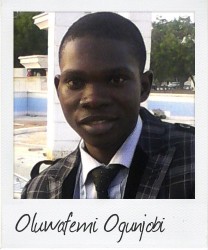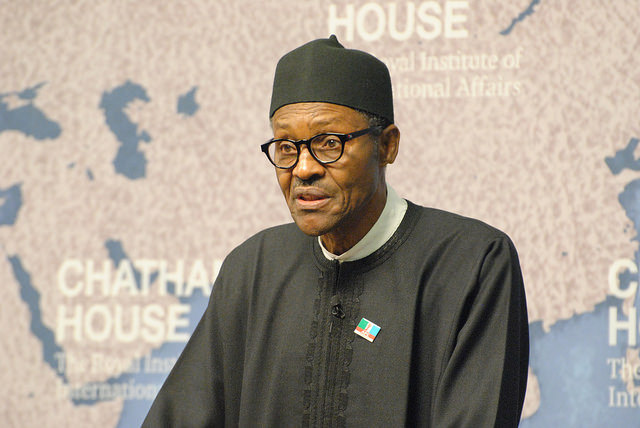“Nigeria and its ‘freelance’ president”
May 4th, 2017 Health-related absences have marked this term of presidency in Nigeria. Oluwafemi Ogunjobi, 25, a Commonwealth Correspondent from Nigeria, looks at the facts and the impact on government and the public.
Health-related absences have marked this term of presidency in Nigeria. Oluwafemi Ogunjobi, 25, a Commonwealth Correspondent from Nigeria, looks at the facts and the impact on government and the public.
The latest news about Nigeria’ President, Muhammadu Buhari is that he will now function as the commander in chief from the comfort of his room, according to the Minister of Information. This came after he missed – for the third time since his return from a UK medical trip – the weekly federal executive council that has always been chaired by him. His deputy, Prof. Yemi Osinbajo, among other members of his cabinet, waited endlessly for the president’s arrival to chair the meeting, until the state’s house chief of protocols suddenly stepped in and whispered to the deputy – who later chaired the council meeting.
What was whispered into the deputy’s ears was confirmed after the meeting by the information minister, Lai Mohammed, who said ”Buhari was absent at the council meeting because he asked that he be allowed to rest, and asked the VP to preside. And he will be working from home today. He has asked that all his files to be taken to him in the house. He will be working from home today.”
It is not the first time the president missed the council meeting. He was also absent April 12, raising concerns about his health, which were quickly dismissed with the explanation that he had other matters to attend to. After missing a second meeting last month time, the Presidency said Buhari’s absence at council was a last minute’s decision, according to a statement by his media aide.
Yet President Buhari has not been making public appearances since he returned to the country after a 50-day medical trip from United Kingdom on March 10. Last Friday, he also missed the Juma’at prayer at Aso Rock mosque – the first since his return from the UK medical trip.
Shortly after his return from the UK, Mr. Buhari hinted about returning to the hospital, saying there might be a need “for further follow-up within weeks.” But Mr. Buhari did not reveal any details of his condition. He only said he has never ”been so sick”.
The latest development of his absence at council meetings and non-appearance in public further nails the fact his health is far worse than public officials admit, leaving people to speculate whether he is fit to continue in power.
The septuagenarian and retired major general has been a recipient of medical attention several times since coming to power. He travelled to London in June 2016, reportedly consulting with an ear, nose and throat specialist after he contracted an ear infection.
Perry Brimah, a popular Nigerian columnist, raised alarm about Buhari’s health, saying that the President is dying in Aso rock villa but he is being locked up by superior forces, otherwise known as the ‘cabal’.
Brimah said, “there can be no denying how chronically ill president Buhari looks when he seldom does appear in public. The videos of Buhari walking for Friday prayers brings tears to eyes. His asthenic figure now no more than skin-to-bone as he sat for the Jummah service was heart wrenching.”
Earlier in the week, the president’s chief security officer expelled (but later recalled) a journalist from the presidential villa after he had written a report on Buhari’s ill health, sparking a negative reaction from the president’s security team.
That the health of the president is the news everyday, on the pages of newspapers and television screens, is not cheering.
As of late April, there had been over 8000 reported cases of meningitis in Nigeria, and 813 deaths, and it is not slowing down yet. The first case of the disease was first reported in Zamfara state in November 2016. By February 2017, it had become more widespread in the Northwest and Northcentral zones in Nigeria and was declared an epidemic in the states of Katsina, Kebbi, Zamfara, Niger, Sokoto and Yobe. A public health official has even called for divine intervention, as they remain helpless in the situation.
The 2017 budget of growth and recovery is in jeopardy. The appropriation document’s fate lies hanging in the balance, following the home invasion of the parliament’s chairman on appropriation by security agents with several documents concerning the 2017 budget carted away. Yet, the parliament has till May 5 to pass the national document.
Given the topsy-turvy political climate in the country and the issues that surround President Buhari’s health, there is every reason to believe that the jostle and schemes for his replacement is already going on. Already, Nigerians are calling that he transfers power to his deputy, Osinbajo, who filled in admirably for him while in Britain.
In this new political dispensation that we find ourselves, the business of the government is the business of the people. But not so much is done by Nigerian government to adhere to this political culture. The situation is disappointing – and the citizenry is bitter – especially for a government that was elected on a wave of change, transparency, and accountability, but has nothing to show for it.
photo credit: theglobalpanorama Gen Buhari via photopin (license)
…………………………………………………………………………………………………
About me: I am a purpose-driven Nigerian, student, freelance writer, and youth development advocate. I am continuously involved in productive activities that affect human lives, purpose and dignity.
I am passionate about writing. I seek to bring global headliners together through it, and equally to demonstrate how passionate commitment to excellent reporting and storytelling makes a difference in the lives of people everywhere. I also love travelling and playing soccer.
…………………………………………………………………………………………………
Opinions expressed in this article are those of the author and do not necessarily represent the views of the Commonwealth Youth Programme. Articles are published in a spirit of dialogue, respect and understanding. If you disagree, why not submit a response?
To learn more about becoming a Commonwealth Correspondent please visit: http://www.yourcommonwealth.org/submit-articles/
…………………………………………………………………………………………………




